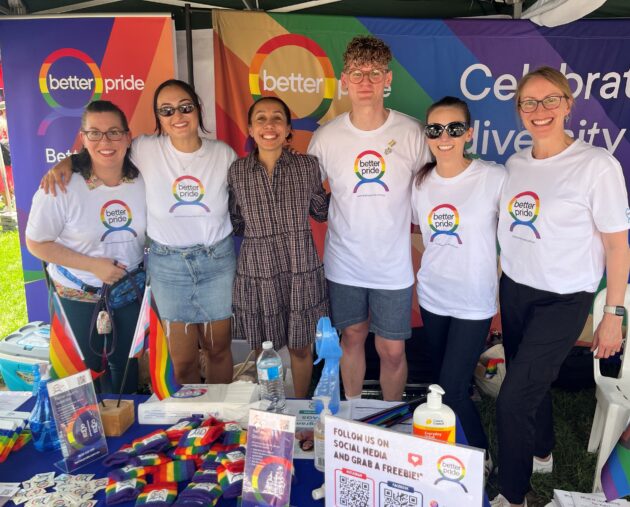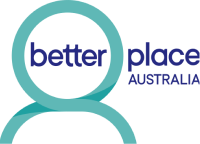LGBTQI+ people share insights on what makes a better relationship
By Sarah Marko
Published 24 January 2025
 At the Midsumma Carnival 2025, we asked members of the LGBTQI+ community what makes a better relationship. Over 150 community members shared their thoughts. Below, we present the findings from our thematic analysis of these real-life responses – collected on sticky notes during the festival.
At the Midsumma Carnival 2025, we asked members of the LGBTQI+ community what makes a better relationship. Over 150 community members shared their thoughts. Below, we present the findings from our thematic analysis of these real-life responses – collected on sticky notes during the festival.
The responses were diverse and reflective of experiences beyond heteronormative frameworks. Rather than relying on traditional ‘one-size-fits-all’ advice, the community emphasised open communication, individuality, and the freedom to create relationships that allow for personal values and identities. We hope the perspectives shared here resonate with those seeking inclusive, authentic ways to build better relationships in the LGBTQI+ community.
Communication
The LGBTQI+ community consistently highlighted the importance of open dialogue. Communication wasn’t just about speaking your own thoughts or needs but also actively listening and truly hearing one another – listening from a place of curiosity and learning rather than judgment.
- “Communication is key.”
- “Talk it out.”
- “Listen to understand.”
- “Communication on all topics. A safe place to discuss sex, money, goals, etc.”
- “Remember: It is you and your partner against the problem, not against each other!”
Trust and honesty
We consistently heard that honesty is a must-have for building and keeping trust. This was tied with open communication, seeing as both create a safe emotional space. The LGBTQI+ community stressed the need for patience, understanding, and genuine effort – especially if trust has been broken.
- “Honesty is the best policy.”
- “Trust and communication.”
- “Always be truthful to each other.”
- “Honesty!!”
Emotional support and compassion
The community also highlighted the importance of kindness, empathy, and emotional availability in relationships. This included being gentle with one another’s shortcomings and offering a safe space to share vulnerabilities. Many emphasised the need to remain supportive and strive for peaceful resolutions when there is conflict or when life is stressful.
- “Give them grace sometimes.”
- “Be kind and think before you say xox”
- “Hold space when your friend or partner are feeling down.”
- “Patience. Kindness. Love.”
- “Let the little things go”
- “Kindness is key. Be nice to yourself and others.”
Authenticity & self-identity
Another strong theme was centred on being true to oneself and maintaining a sense of individuality. LGBTQI+ people prioritised self-love, with authenticity being a non-negotiable foundation to a healthy relationship. Some felt that if you can’t be your true self or look after your own needs in a relationship, then it’s probably not the right one for you.
- “Be true to yourself.”
- “Don’t lose yourself in your partner.”
- “If they don’t like you for you, screw them! They’re missing out.”
Boundaries and independence
Reflecting the need for authenticity, LGBTQI+ people told us about the importance of maintaining healthy boundaries and ensuring that neither partner is consumed by the relationship. Maintaining one’s own sense of self requires having space for individual pursuits outside of the relationship. “Learn to be okay to say ‘no’.”
- “Give each other space to be themselves.”
- “Don’t be a people pleaser.”
- “Nobody owns you!”
- “Separate holidays from time to time”
Growth and development
The community highlighted personal and relationship growth: working through issues, embracing change, and viewing relationships as an ongoing journey. This perspective reflected that a ‘better’ relationship is one in which people can learn, adapt and evolve together.
- “Personal growth. Be prepared to work on issues!”
- “Be prepared to work on issues! Even if they don’t get resolved, at least you are trying.”
- “Growth is secret sauce to a great relationship.”
- “Be ready to show your vulnerable self.”
Alternative relation structures and non-conformity
The LGBTQI+ community endorsed non-traditional or fluid relationship models, emphasising the importance of disregarding conventional norms and honouring each person’s genuine needs and identity. When speaking with people, we heard about the challenging but rewarding experience of remaining friends with an ex-partner. Some jokingly (or seriously) advocated for people to “Stay single”.
- “Be poly?”
- “Validate their gender.”
- “Be gender chaotic.”
- “Live apart”
Light-hearted and cynical remarks
Some left comedic responses – hinting at lessons learned through personal experience.
- “Avoid J names”
- “Don’t fight when you are hungry”
- “Happiness comes from horses, not relationships”
- “Life’s a bitch and then you die. BE FABULOUS NOW”
- “Roller derby teammates are friends, not food”
- “Kiss your friends instead.”
Final thoughts
Collectively, the LGBTQI+ community told us that ‘better’ relationships are those grounded in open communication, respect, mutual support, and a commitment to personal authenticity and growth. There was a strong emphasis on being true to one’s own needs, challenging conventional or heteronormative norms that don’t serve individual needs, and ensuring all feel affirmed and heard.
Better Pride is an initiative by Better Place Australia dedicated to celebrating and supporting diverse LGBTIQ+ families and the community. Our mission is to create a safe, inclusive, and affirming space where individuals, couples, and families can access support services provided by practitioners who are proud members and allies of the LGBTIQ+ community, ensuring culturally sensitive and empowering care.







